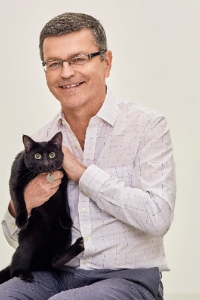David Grant - Graduate Certificate in Management - 1995

Having started as a family business on the Gold Coast, Real Pet Food Company is now going global, says CEO David Grant.
When one thinks of a huge, billion-dollar global industry, one thinks of fast food, media, tech. The pet food industry may not spring to mind, but one Australian company looks set to change that.
Real Pet Food Company (RPFC) has dominated the Australian pet food industry, with an impressive annual revenue of around A$500 million (up from A$300 million a few years back). The company has its origins in a smaller family-run business on the Gold Coast, founded in 1994. The founders, the Quinn family, remain invested in the company, but ownership recently changed hands from Quadrant Private Equity to a consortium of Chinese and Singaporean investors. The transaction valued the company at A$1 billion, and CEO David Grant believes RPFC is only going to flourish from here on.
David Grant, CEO of Real Pet Food Company
Future of the business
“We’ve gone from private equity management, which is a very small group making business decisions and obviously focused on a particular outcome with a rather short-term focus, to a fairly sophisticated group of investors who have long-term plans, and a clear vision for the future of the business,” says David.
Part of that clear vision involves strengthening RPFC’s global presence. Though only one of the company’s 10 manufacturing facilities is located outside of the Australia–New Zealand region, a number of strategic acquisitions have helped its international growth. One such acquisition is the British brand Billy + Margot, which is aiding expansion into both the UK and the US, the latter of which has a pet food market valued at US$27 billion.
“We’re in about 1,600 grocery stores in the US already,” David says. “There’s also our Farmer’s Market brand, which we ship from here. We’re about to go to a couple of major pet specialty chains. From an organic perspective, this is really encouraging.”
“We’re in about 1,600 grocery stores in the United States already … From an organic perspective, this is really encouraging.”
Growth strategy
The Asian market is another prospective avenue for the company, and it’s expected to reach US$10.7 billion by 2020. RPFC has recently begun shipping to China, and will be making a major push over the next few years. Given that 55% of pet food sales in China are online, ecommerce platforms will be an important strategy for the company.
Back home, the Australian market, though smaller than that of China and the US, is expected to grow at an increasing rate.
David believes the market is being driven by millennials expecting more innovative products, and RPFC is well-positioned to take advantage of this.
“If we see a trend – like grain-free –moving in the market, we can then switch our production towards what the consumer is looking for,” he says. “Millennials are always looking for different formats or brands that are a little quirky. We’re in a position to respond to whatever they want, unlike the heritage, mainstream brands.”
To this end, RPFC has partnered with other companies to create new, boutique products. “We work with two or three significant companies that provide things like probiotics or flavour enhancers,” he says. “And we get them simply to improve the quality of the product. We also work with a couple of teaching universities, here and overseas, to make sure that what we’re working on is appropriate and ethical.”
David has been CEO at RPFC since 2015, but before that he worked for 25 years at Nestlé, with brands like Purina. At RPFC, he has worked with a number of people he’d known throughout those 25 years, and has therefore cultivated an expert management team around him. David attributes a great deal of the company’s accomplishments to the trust, understanding and support he shares with his team.
Motivation to succeed and grow
What’s more, the growth of his staff members is a source of encouragement for David. “I’ve seen a lot of people progress and move on, who now run companies or have their own businesses,” he says. “That’s motivating. It’s great to see people who’ve worked for you succeed and grow, and have really successful careers.”
“It’s great to see people who’ve worked for you succeed and grow and have really successful careers.”
At the same time, David’s motivation also comes from the industry itself. “I love the pet industry. I’ve got a dog and a cat. My family loves pets. And if you love pets, it’s empowering to develop products and work with like minds in this industry.”
By Oliver Featherston
Click here for original story provided by The CEO Magazine Story
